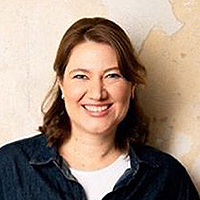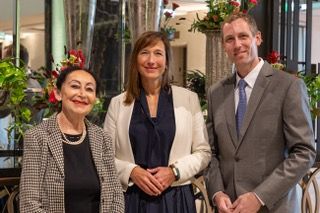EU High-Tech Trade Surplus + Merz’s Reform Dilemma + Trump and the Multilateral Hub + Living with Climate Change + Europe’s AI Act + H-1B Fee Windfall for EU AI Startups + Berlin Festival of Lights
The EU’s new AI Act is often described as the world’s first major attempt to regulate AI. What principle sits at the heart of the law?
Risk-based classification of AI systems
 Dear Readers,
Dear Readers,
Welcome to the Diplomacy Berlin Newsletter.
Our focus this week spans across innovation, leadership, and global economic and political developments. We are pleased to feature an exclusive conversation with Erwin Feldhaus – an entrepreneur, investor, and advisor exploring Europe’s strengths in nurturing startups, the challenges founders face in scaling globally, and the critical importance of contextual leadership in bridging public, private, and non-profit sectors. Feldhaus also highlights how storytelling can foster dialogue and understanding across societies at a time when politics often divides.
Alongside this, we examine Europe’s high-tech trade, which has flipped to a surplus in 2024, political debates over Germany’s domestic reform versus global leadership ambitions, the implications of Trump’s $100,000 H-1B visa fee for AI startups, and Europe’s risk-based approach to AI regulation. We also reflect on climate adaptation and the need for resilient infrastructure in the face of extreme weather events.
We extend our heartfelt congratulations to the countries celebrating national days this week: China, Cyprus, Nigeria, Palau, Tuvalu (October 1), Guinea (October 2), Germany (October 3), and Lesotho (October 4), honoring their heritage, resilience, and contributions to the global community.
As always, thank you for joining us, and if you would like to contribute content for upcoming newsletters or press releases, please contact us at editorial@diplomacy.berlin.
With best regards,
Sigrid Arteaga
Innovation, Leadership, and Cultural Storytelling in Europe
Erwin Feldhaus is an entrepreneur, investor and international Non-Executive Director and advisor. His portfolio includes his practice focused on leadership and business transformation, a software business dedicated to asset management and advisory in venture and M&A. He has held senior executive roles across Europe and the Americas, leading turnarounds, restructuring, and international expansion in industries ranging from aerospace and advanced materials to SaaS and government trade promotion.
A graduate of RWTH Aachen (MSc Mechanical Engineering) and INSEAD (MBA), with further executive education at MIT Sloan and INSEAD, he is also an ICF-accredited executive coach. Fluent in English, German, French and Spanish, Erwin co-founded Abeja Productions, a theatre and film company dedicated to “changing the world, one story at a time.“

With your role as Venture Partner at Loyal VC and experience guiding founders, what do you see as Europe’s biggest strengths and challenges in nurturing globally competitive startups especially in light of Eurostat’s recent data showing modest but steady economic growth in the EU?
Europe has clear strengths. Its diversity creates complementary entrepreneurial ecosystems, with world-class universities and research institutions feeding innovation. Traditions like the German Mittelstand or the Northern Italian industrial clusters show the strength of entrepreneurship embedded in local economies. European companies are often international from inception, giving them a head start in expanding globally.
Challenges remain. Administrative complexity and the “cost of non-Europe” documented by the European Commission hold back scale. Cost structures in Europe are higher, meaning productivity must compensate. Access to capital is another barrier: compared with the US, Middle East or East Asia, European capital tends to be more conservative. As a result, some European founders choose to relocate to regions where risk capital is more easily available.
Your career has bridged public, private, and non-profit sectors across different cultures and industries. What lessons have you learned about contextual leadership, and how can leaders best adapt their style when working with international teams and stakeholders?
I see leadership as contextual. Having worked with governments, corporates, family businesses and start-ups across Europe, the Americas and beyond, I’ve learned there is no one-size-fits-all model. The same holds true even within a single organisation: decisions must be taken in light of the specific context. Practices that succeed in one setting can fail in another if applied mechanically. It is easy to criticise actions when stripped of their context, but sustainable change requires careful adaptation. Leaders must therefore cultivate situational awareness, listen deeply, and adjust their style to culture, timing and circumstances rather than relying on a static toolkit of “best practices.”
Abeja Productions frames its mission as “changing the world, one story at a time.” In your view, how can cultural storytelling through theatre and the arts serve as a form of diplomacy, building bridges between societies at a time when politics often divides?
The arts create dialogue where politics often builds walls. Storytelling allows complex issues to be explored in human terms, inviting empathy rather than polarisation. We recently saw in popular culture – for instance in the debate triggered by Jimmy Kimmel’s remarks how artists can provoke meaningful public conversation. In theatre, this potential is even stronger: audiences share a live experience that can open perspectives across divides. Cultural exchange through the arts complements diplomacy by building understanding and trust at a human level. At Abeja Productions, our aim is precisely that to use stories to connect people who might otherwise remain separated.
EU high-tech trade flips to surplus in 2024
After four consecutive years in deficit, the European Union recorded a €23 billion surplus in high-tech trade with non-EU partners in 2024, compared to a €15 billion deficit in 2023. According to Eurostat, exports of high-tech goods grew by 8.1% to €501 billion, while imports edged down slightly to €478 billion. Pharmaceuticals, electronics, and aerospace were the main growth drivers, with the United States and the United Kingdom acting as the largest external markets.
The shift highlights how Europe’s high-tech sector has regained competitiveness on the global stage despite headwinds from geopolitical tensions and supply chain vulnerabilities. For Germany, the largest high-tech manufacturing hub in the EU with nearly 9,000 firms and over 660,000 employees in the sector, the surplus underscores both opportunity and responsibility: Berlin’s ability to innovate, invest in R&D, and stabilize supply chains will shape how sustainable this recovery becomes.
Read more about the trade surplus on Eurostat.
Merz cannot choose between domestic reform or global leadership
In “Dispatch from Berlin,” Jörn Fleck and Rachel Rizzo argue that Chancellor Friedrich Merz is trapped by a false binary: either focus on fixing Germany at home or assert Germany abroad. They show how Merz’s bold foreign policy signals like vocal support for Ukraine and re-engagement with the U.S. contrast starkly with domestic pressures: yawning fiscal deficits, under investment in infrastructure, productivity lags, and deep public aversion to debt. Fleck and Rizzo warn that giving in to this choice would hobble Germany’s credibility and capacity. Germany must simultaneously modernize internally while continuing to lead in Europe’s security architecture. For German readers, it’s a reminder that Berlin’s standing abroad is only as stable as its foundations at home.
Read more about it on the Atlantic Council’s website.
Is Trump dismantling the world's multilateral hub?
The Rest in Politics episode on „Is Trump Destroying the United Nations?“, Rory Stewart and Alastair Campbell ask whether Donald Trump’s attacks on the U.N. amount to rhetoric or real institutional damage. They debate the prospect of moving the U.N. headquarters out of New York, the politics of Palestinian recognition, and how U.S. disengagement could undermine the legitimacy of multilateralism.
For Germany, a top donor and committed multilateral actor, the stakes are clear: if the U.N. weakens, Berlin loses a vital platform for influence. It would force Germany to rethink how it projects power through the EU, regional blocs, or new frameworks while also managing risks for its export industries and global supply chains.
Listen to the full episode on Apple Podcasts.
Living with climate change: heat, rain, and adaptation
DW’s documentary Living with climate change highlights the daily battle against heat and rain takes viewers into the lives of communities already living on the frontlines of climate disruption. From urban residents grappling with relentless heatwaves to rural families rebuilding after repeated floods, the documentary shows how extreme weather is no longer an abstract warning but a daily reality. It captures both resilience and vulnerability: new housing designs, makeshift drainage systems, shifting work routines, and the human toll of health risks and displacement.
The narrative is global, but the lessons cut close to home. Germany has already faced record heat summers and devastating floods, and its ability to adapt through urban planning, river management, insurance systems, and investment in green infrastructure will shape not just its climate future but also its economic competitiveness. The documentary is a reminder that adaptation is not a choice, but an urgent task for Europe’s largest economy.
Watch in detail on DW Documentary’s YouTube Channel.
From Fall of the Wall to Unity: Lessons in transformation and memory and Europe's AI Act: Setting global rules through risk-based regulation
The Konrad-Adenauer-Stiftung’s “From Fall of the Wall to Unity” traces how the Peaceful Revolution of 1989 and the collapse of the GDR regime paved the way for German unification in 1990. It highlights how grassroots protest movements, mass demonstrations in Leipzig, and political negotiating maneuvers (like Kohl’s Ten-Point Plan) combined to dismantle the East-West divide.
The narrative is not just historical it’s a lens for viewing the fragility of political orders, how legitimacy can erode, and how transformation demands both vision and institutional will. For Germany today, revisiting this moment offers more than nostalgia. It reminds Berlin of the costs of polarization, the importance of civil society, and the challenge of integrating divergent systems lessons still relevant as the country wrestles with social change, European cohesion, and the recalibration of its role abroad.
Learn more about it on KAS.
Europe’s AI Act: Setting global rules through risk-based regulation
The EU’s new AI Act is widely seen as the first comprehensive law to regulate artificial intelligence. At its core lies a risk-based framework, which classifies AI systems according to the potential harm they may cause from minimal risk to unacceptable risk, and applies obligations accordingly. The aim is to safeguard fundamental rights while still encouraging innovation, making Europe a standard-setter in global AI governance. For Germany, this means both opportunity and challenge: as one of Europe’s largest tech and industrial hubs, it must ensure compliance while also showing how regulation and competitiveness can go hand in hand.
Read more about it on the official website of the European Union AI Act.
.
Trump's $100,000 H-1B visa fee: a windfall for European AI startups?
President Trump’s decision to impose a $100,000 fee on employers applying for new H-1B visas has rattled Silicon Valley, where companies warn of an exodus of international talent. Forbes reports that European AI startups could be unexpected winners, suddenly in a stronger position to attract engineers, researchers, and founders discouraged by U.S. barriers. The development highlights how shifting immigration policy in Washington can reconfigure the global tech race. Germany, with its deep-tech ecosystem and demand for skilled talent, stands to benefit if it can streamline its own visa pathways and innovation incentives.
Read the full story on Forbes.
International Institute for Strategic Studies (IISS)
The IISS is one of the world’s most influential think tanks on defense, security, and international affairs. Founded in 1958, it is best known for its flagship reports such as The Military Balance, its journal Survival, and high-profile events like the Shangri-La Dialogue. Beyond military analysis, IISS provides in-depth insights into political risk, technology, and shifting global power dynamics. For Germany and Europe, its research offers valuable perspective on alliance commitments, capability gaps, and the broader strategic environment shaping NATO and EU security debates. Following IISS is a way to stay ahead of how security and diplomacy intersect with trade, business, and foreign policy.
Explore their work on IISS’s website.
Berlin’s Festival of Lights – Embassies Illuminate Their Stories
Each year during the Festival of Lights, diplomatic missions across Berlin become canvases for light art and national stories. Embassies such as those of the U.S., Canada, Italy, and Singapore participate with video projections, cultural motifs, and architectural mapping that highlight heritage, diplomacy, and public engagement. The festival transforms not just museums and monuments, but also foreign missions into public storytellers. It runs from October 8 to 15, under the motto “Let’s Shine Together,” with illuminations from 7 p.m. to 11 p.m. nightly.
To know more about the Festival visit their website.
Berlin Global Dialogue 2025
The Berlin Global Dialogue (BGD) brings together political, business, and academic leaders in Berlin to debate how power is shifting in a fractured world. The 2025 edition will happen from October 23–25, and is built around the theme “Shifting Power, Shaping Prosperity”, with panels on trade, energy transitions, industrial strategy, and climate resilience.
Registration is now open through the official BGD’s website.
Ambassadors Club Invites to Discussion with Incoming DW Director General
On October 1, 2025, Deutsche Welle (DW) Director General Peter Limbourg will hand over leadership to his successor, Barbara Massing, after twelve years at the helm of Germany’s international broadcaster. Photo: filum rubrum fotografie / Andrea Johligenia Feilcke-Dierck, together with Vice President Martin Hoeck, took the opportunity to invite the designated Director General to an exchange in mid-September.
Barbara Massing accepted the invitation to the Jour Fixe at the Waldorf Astoria Hotel, where she spoke on the topic: “Free Media Under Pressure – Europe’s Responsibility in Times of Global Censorship.”
More than 40 ambassadors from across the globe participated in lively and engaging discussions with the former Administrative Director and soon-to-be Director General. Key themes included the independence of public broadcasters, the challenges faced by journalists in crisis regions, and the importance of highlighting positive news stories.
Photo: filum rubrum fotografie / Andrea Johlige (Barbara Massing is pictured in the center.)

Mama Rosas Taqueria
Craving something bold, fresh, and a little bit spicy? Mama Rosas brings authentic Mexican flavors to Berlin with tacos, quesadillas, corn soup, and more. On the drinks side, the vibe is just as adventurous, featuring micheladas (a beer-cocktail mix) and other refreshing Mexican beverages.
What makes it special? Owners Maike and Marian launched Mama Rosas to make “friend taco night” accessible. Their creative touches appear not only in the food but also in the experience, from 3D-printed ceramic taco holders to playful design elements.
Locations:
Mehringdamm 72, 10961 Berlin (Kreuzberg)
Washingtonplatz 3, 10557 Berlin (The Cube)
Visit their Instagram page for more details.
Get ready for the cold – slip into wool slippers from Glerups
As October cools into winter, nowhere is the comfort of wool more welcome than right under your feet. Glerups produces slippers knitted from a special wool blend that’s naturally temperature-regulating, itch-free, and moisture-managing. Their range includes indoor slip-ons, boots, and slippers with rubber soles so you can step outside briefly—perfect for Berlin’s damp mornings.
To get your own pair visit Glerup’s website.
More jobs at politjobs.com
